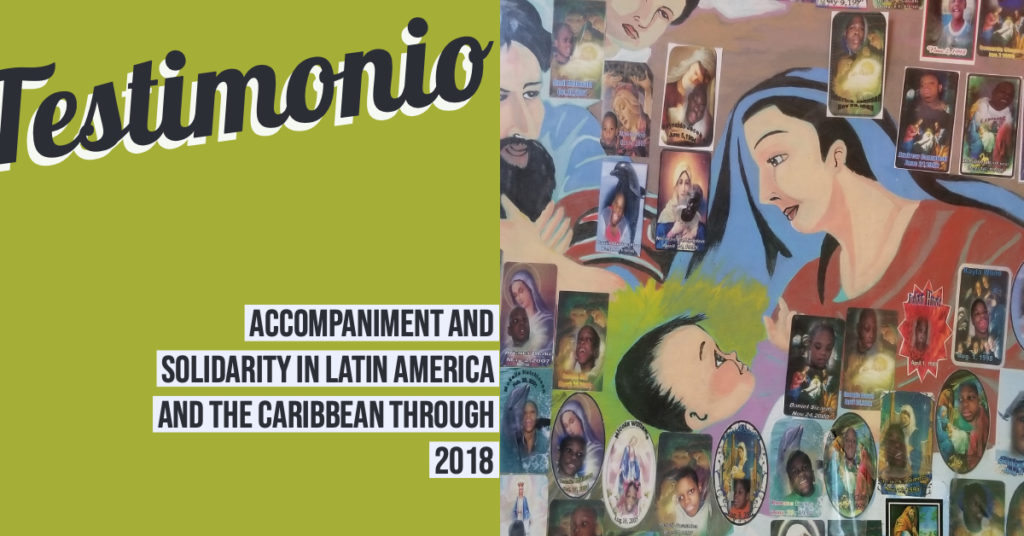Testimonio: Telling the Story of the Accompaniment and Solidarity in Latin America and the Caribbean Through 2018
Introduction:
As we end this year of witnessing God´s presence in Latin America and the Caribbean, we cannot avoid feeling in our spirit, mind and will the spiritual strength of solidarity. Our partners continued embracing the Spirit through receiving pilgrimages, sponsoring workshops and projects, sharing resources in an ecumenical way and confronting the powers that deny the fullness of life. The Caribbean Initiative came to closure with resources and experiences that will endure not only in the work of the continent but also globally. The accompaniment of our partners through civil unrest, migrations, and emergencies awakened a divine presence through the experience of contingency. The Good News were heard and shared in a powerful way.
Testimonios through the Region:
Puerto Rico: Both the Christian Church (Disciples of Christ) in the U.S.A. and Canada and the United Church of Christ in the U.S.A. has accompanied Global Ministries’ partners through the humanitarian crisis lived on the island after the passing of Hurricane María in 2017. On November 25, 2017, a delegation composed by the DOC General Ministries, led by the Reverend Teresa “Terri” Hord-Owens, DOC´s General Minister and President, were invited by the Christian Church (Disciples of Christ) in Puerto Rico to participate in their Administrative Board Meeting held that month. In that meeting, the Administrative Board expressed their gratitude for the solidarity and the accompaniment of its sister church in the U.S. and Canada. Both the Reverend Julia Brown Karimu, President of the Division of Overseas Ministries and Global Ministries’ Co-Executive and the Global Ministries´ Area Executive for Latin America and the Caribbean, were part of that delegation. In the afternoon of the 25th, both Reverends Brown Karimu and Rivera-Agosto participated in the Joint Commission Meeting of both U.S. and Canada and Puerto Rico churches. There, both leaders presented reports about the work of Global Ministries throughout the world, specifically in Latin America and the Caribbean. Later in that week, a delegation composed by representatives of the Latin America and the Caribbean Office of Global Ministries, Week of Compassion and UCC Disaster Ministries visited projects and partners in the island. They had the opportunity to visit the Ryder Hospital in Humacao, the Evangelical Seminary of Puerto Rico and two communities in Bayamón and Naranjito, respectively, related to the work of Amaneser 2025.
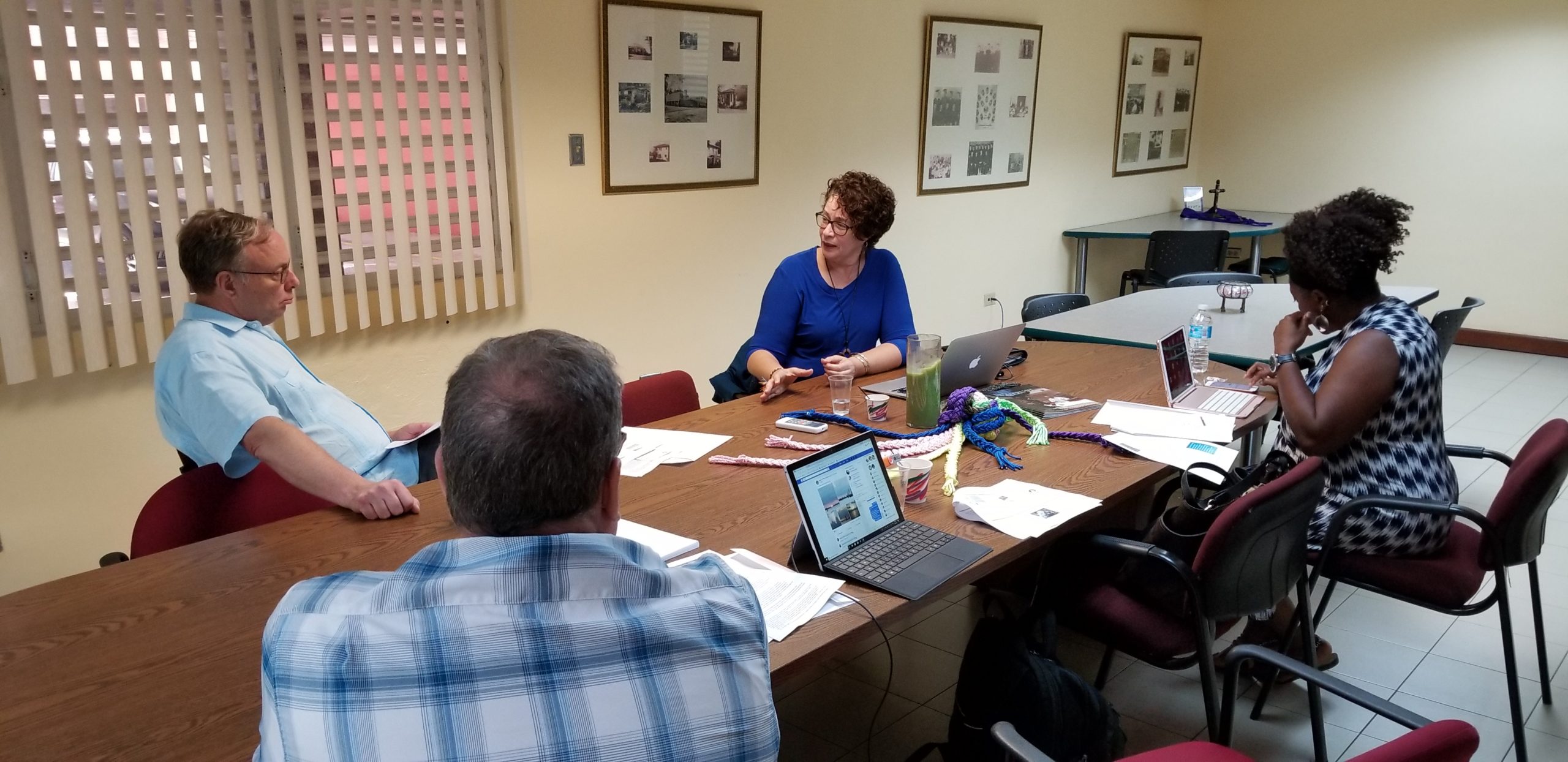 Later, on September 6-7, 2018, The Area Executive accompanied three leaders from the UCC to a visit to the United Evangelical Church of Puerto Rico. Reverends James Moos, Karen Georgia Thompson and John Vertigan held meetings with pastors, the IEUPR Executive Council and visited projects sponsored by the IEUPR (Ryder Hospital and Yuquiyú Retreat Center, among others) that are in the process of reconstruction and recuperation after the damages caused by Hurricane María. The visit had the main objective to reestablish relations between the UCC and the IEUPR, into a renewed partnership in the near future. The group also had the opportunity to visit the Evangelical Seminary of Puerto Rico, one of Global Ministries’ partners in Puerto Rico, to oversee the work of reconstruction and recovery from the damages suffered by the passing of Hurricane María through the island.
Later, on September 6-7, 2018, The Area Executive accompanied three leaders from the UCC to a visit to the United Evangelical Church of Puerto Rico. Reverends James Moos, Karen Georgia Thompson and John Vertigan held meetings with pastors, the IEUPR Executive Council and visited projects sponsored by the IEUPR (Ryder Hospital and Yuquiyú Retreat Center, among others) that are in the process of reconstruction and recuperation after the damages caused by Hurricane María. The visit had the main objective to reestablish relations between the UCC and the IEUPR, into a renewed partnership in the near future. The group also had the opportunity to visit the Evangelical Seminary of Puerto Rico, one of Global Ministries’ partners in Puerto Rico, to oversee the work of reconstruction and recovery from the damages suffered by the passing of Hurricane María through the island.
Jamaica: The Reverend Julia Brown Karimu, President of the Overseas Ministries Division and Co-Executive of the Global Ministries visited, together with the Executive for Latin America and the Caribbean at Global Ministries, partners in Jamaica, from February 7-12, 2018. During their visit, both leaders of Global Ministries had the opportunity to dialogue with the United Church of Jamaica and the Cayman Islands, the United Theological College for the Western Isles and the International University of the Caribbean. In their meetings with the church and the ecumenical education ministries, Reverends Brown Karimu and Rivera-Agosto were able to perceive the social context the country is living and its challenges to the church. One of them is violence and crime, as well as unemployment, corruption, inequality, and dysfunction in families. This context has placed the church in the call to strengthen the ministries of local, economic development with emphasis on education and capacity building, as well as attention to the protection and shelter of children, chaplaincies, and awareness to strengthening the family. Another focus that they shared with us has to do with the advocacy and public testimony of the church, as well as the creation of economic and social partnerships with other sectors of civil society. As part of that visit, Reverends Brown Karimu and Rivera Agosto were invited to participate in a gala and celebration worship for the 25 years of ministry of the United Church in Hellshire, a congregation located in the capital. Both pastors could witness the thankfulness of that congregation for the ministry of William and Veronica Kyle, two Ex Mission Co-workers of Global Ministries, who worked in said church and contributed to the construction of the temple that they use now as their house of worship.
Dominican Republic: As part of the Caribbean Initiative, ten members of the Common Global Ministries Board traveled to the Dominican Republic the first week of April 2018. There, they met and visited projects of the various Global Ministries’ partners to celebrate relationships and to receive and share the Good News of Jesus Christ. The group had the opportunity to visit Social Services of the Dominican Churches (SSID), Proyecto Educativo Caminante, the Christian Center of Family Counseling (CECAF), ALFALIT Dominicano and the Evangelical Dominican Church. Particularly with the EDC, the delegation lived the experience of worshipping God in a Caribbean context and knowing what does it mean to be a church in the Dominican Republic. Issues like the rights of stateless people, human trafficking, the right to water and sustainable development were deep in the agenda of the pilgrimage. They had the chance to visit a Dominican-Haitian Batey or marginalized community in the outskirts of Santo Domingo, talked and shared with the families in that community. As one of the participants shared in a written report “I felt honored and privileged to have been able to be in the Dominican Republic and take these gifts back home with me. It will be my job as a Global Ministries board member to explain critical presence and mutuality to my congregation and friends. This amazing trip has given me a renewed purpose of taking the strategic direction of Global Ministries to heart and spread this message within my community.”
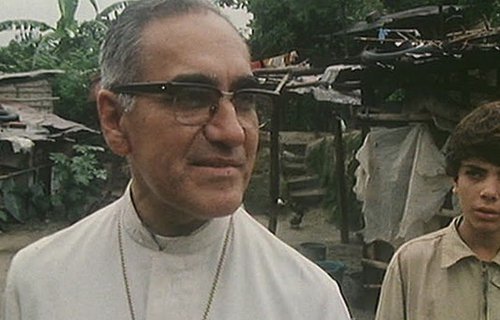 El Salvador: The Area Executive had the opportunity to visit three countries in Central America (El Salvador, Nicaragua and Guatemala), carrying a message of solidarity and accompaniment to partners there. As part of his visit to El Salvador, the Reverend Rivera-Agosto could acknowledge the ministry of both Emmanuel Baptist Church (EBC) and the Salvadorian Lutheran Synod (SLS), as they are engaged in exciting work toward a culture of peace. Their projects address the root causes of violence, injustice, and migration. SLS focuses on trauma healing, ecumenical and inter-religious networking, communications, health and wellness, elementary and middle school projects, and the work with “maras” or youth gangs. EBC prioritizes youth cultural projects, Christian Education, local grants for students, youth efforts in peace mediation and sustainable development. There are also prophetic issues that our friends are working on in El Salvador. The right to clean water is addressed by the Salvadorian Ecumenical Movement (composed by mainline Protestant churches along with the Roman Catholic Church and religious institutions such as the Central American University), to address the Salvadorian Legislative Assembly’s proposed bill that would privatize access to clean water.
El Salvador: The Area Executive had the opportunity to visit three countries in Central America (El Salvador, Nicaragua and Guatemala), carrying a message of solidarity and accompaniment to partners there. As part of his visit to El Salvador, the Reverend Rivera-Agosto could acknowledge the ministry of both Emmanuel Baptist Church (EBC) and the Salvadorian Lutheran Synod (SLS), as they are engaged in exciting work toward a culture of peace. Their projects address the root causes of violence, injustice, and migration. SLS focuses on trauma healing, ecumenical and inter-religious networking, communications, health and wellness, elementary and middle school projects, and the work with “maras” or youth gangs. EBC prioritizes youth cultural projects, Christian Education, local grants for students, youth efforts in peace mediation and sustainable development. There are also prophetic issues that our friends are working on in El Salvador. The right to clean water is addressed by the Salvadorian Ecumenical Movement (composed by mainline Protestant churches along with the Roman Catholic Church and religious institutions such as the Central American University), to address the Salvadorian Legislative Assembly’s proposed bill that would privatize access to clean water.
Nicaragua: Nicaragua is living difficult times. Our partners, the Nicaraguan Evangelical Council (CEPAD, acronym in Spanish) and the Interchurch Center for Theological and Social Studies (CIEETS, acronym in Spanish), reported incidents of violence caused by protests against several structural reforms and policies that the government of Nicaragua has tried to put into effect in recent times, the most remarkable being the one regarding the Social Security Law. This generated a great number of protests across the country, especially from the university students. These protests led to people being killed—students, one policeman, one journalist, innocent bystanders, other protesters. In the midst of the crisis, the Area Executive made himself present through a visit to Global Ministries´ partners, from July 4-8, 2018. Reverend Rivera-Agosto had the opportunity to attend meetings with pastors, theological professors, students and leaders from partner churches and ecumenical organizations to hear from them the nature of the crisis, as well as the accompaniment they developed through the situation. As a result, of our dialogues with our partners, Global Ministries approved support to our partners through One Great Hour of Sharing (UCC) and Disciples Week of Compassion providing funds for medical needs, food and other supplies to people affected by the present situation in Nicaragua. The Moravian Church expressed its gratitude for the service of Global Ministries mission co-worker, Jeanette Salley. Jeanette serves as a Christian Education resource person for the church, frequently traveling from the capital city Managua to the rural Atlantic Coast, where many Moravian churches are located. She designs curriculum and educational materials from and for the Afro-Caribbean context of the communities on the Atlantic Coast. Jeanette expressed her happiness with her service with the Moravians. Another Global Ministries mission co-worker in Nicaragua arrived during this past year is Ignacio Salinas. He is serving with the Christian Mission of Nicaragua as a Long Term Volunteer, working in pastoral training, and reinforcing skills in biblical interpretation and theology.
Guatemala: On Sunday, June 3, 2018, at 2:00 p.m. local time in Guatemala, Volcán del Fuego erupted, the most violent eruption of the last 40 years. It impacted the central and southern regions of the country: Sacatepéquez, Escuintla, Chimaltenango, and Guatemala City. The volcano exploded and launched pyroclastic flows (a mixture of sand, rocks, and gases of high temperatures +600 degrees) that directly hit the communities surrounding the volcano. In the most remote areas, the effects included rain, sand, and ash, which interrupted air traffic in the afternoon and evening of Sunday, damaging roofs as well as crops. The Ecumenical Christian Council of Guatemala (ECCG), one of Global Ministries’ partners in Guatemala along with CONAVIGUA, have been active assisting communities near the volcano, particularly in the province of Esquintla where the Catholic Diocese of that town is also working. ECCG is working through the post-emergence stage of the crisis by collaborating in the rehabilitation of communities, ensuring food, security and psychosocial assistance to the victims, specifically the ones that still live in shelters provided by the Diocese. Global Ministries has provided an effective accompaniment through the presence of our partners, our mission co-worker Ricardo Mayol, and funds for projects provided by UCC’s Disaster Ministries and Disciples’ Week of Compassion.
U.S. Mexico Border: The recent Central America Caravan posed a challenge to the people on both sides of the border regarding the rights of immigrants and the root causes of migration, not only in Central America but also in other parts of the world. People are fleeing from countries like Honduras, El Salvador and Guatemala because of internal violence, poverty, climate change and U.S. policies addressed to those countries, among other things. Faith communities continue to show the religious significance of unity and love in the face of increased barriers to protection for asylum seekers and unaccompanied children, which impede our moral and legal obligations to offer protection to vulnerable populations. In that sense, both DOC and UCC churches have been active, participating in the accompaniment of the caravan, leading workshops and visits to the border and signing advocacy documents affirming the rights and the humanity of migrants. Global Ministries held a visit to the Brownsville/Matamoros Border from October 9-11, 2018. There, the Reverend David Vargas, Global Ministries´ President Emeritus and the Latin America and Caribbean Area Executive led a delegation of some DOC General Ministries, including the presence of the Reverend Teresa “Terri” Hord-Owens, General Minister and President, to be present for our partner there, Southwest Good Samaritan Ministries (SWGSM). Feliberto Pereira, SWGSM´s Executive Director and Founder gave us a full report of the conditions and challenges of refugees and asylum seekers on that part of the border. He also took us to the places where the migrants arrived, seeking asylum as well as to shelters where they receive food and medical assistance. On January 23-27, 2019, the Area Executive will be visiting the San Ysidrio/Tijuana border for the accompaniment of another Global Ministries´ partner at the Border: Centro Romero.
Colombia: On January 30, 2018, Reverends John C. Dorhauer and Teresa “Terri” Hord Owens, General Ministers and Presidents of the United Church of Christ in the U.S. and the Christian Church (Disciples of Christ) in the U.S. and Canada, respectively, and the two Global Ministries´ Co-Executives, Reverends Julia Brown Karimu and James Moos, signed a letter sent to the Peace Discussion Table, composed by the Government of Colombia and the National Liberation Army-ELN, to resume peace talks as they have been taking place in Quito, Ecuador. They expressed their grave concern for the challenges facing the peace talks as events such as the attack on the police station in Barranquilla (Soledad – Atlántico), the bombing of an indigenous reservation in Chocó province and the recent wave of assassinations of social leaders could erode trust in the possibility of a sustainable and lasting peace accord among both parties and the people of Colombia. In light of President Juan Manuel Santos’ decision to suspend the fifth round of negotiations at that moment, the church leaders encouraged both sides to return to the negotiations and continue with the agreed upon agenda, to declare a bilateral ceasefire agreement, that could be verified and bring peace to the Colombian people and to show political will from each side to facilitate the continuation of the negotiations. Similarly, they invited the guarantor and accompanier nations to maintain their support for the peace talks as a means to achieving peace in Colombia.
Global Ministries participated in a sign-on campaign for churches and faith-based organizations in response to a death threat against the Christian Centre for Justice, Peace and Nonviolent Action (JUSTAPAZ). On Saturday, July 14, 2018, JUSTAPAZ learned of a communiqué in which an illegal armed group, self-identified as “Águilas Negras” (Black Eagles), threatened to kill a group of social leaders, human rights defenders, organizers and journalists. JUSTAPAZ was included in the list. Responding to these threats and as part of the international community, the two Global Ministries´ Co-Executives and the Area Executive for Latin America and the Caribbean expressed their solidarity, support, and accompaniment of JUSTAPAZ in the face of this threat. They and the rest of the signatories of the document rejected all forms of violence that could affect the staff of JUSTAPAZ and the communities that they accompany in different regions of Colombia. They also demanded that the government of Colombia act with celerity and efficacy in investigating and judging those responsible for the death threats against JUSTAPAZ. Additionally, they demanded the provision of appropriate protective measures for the staff of JUSTAPAZ and the communities they accompany, with the goal of guaranteeing the continuity of the human rights and peace-building efforts they accompany, as a faith-based organization in Colombia.
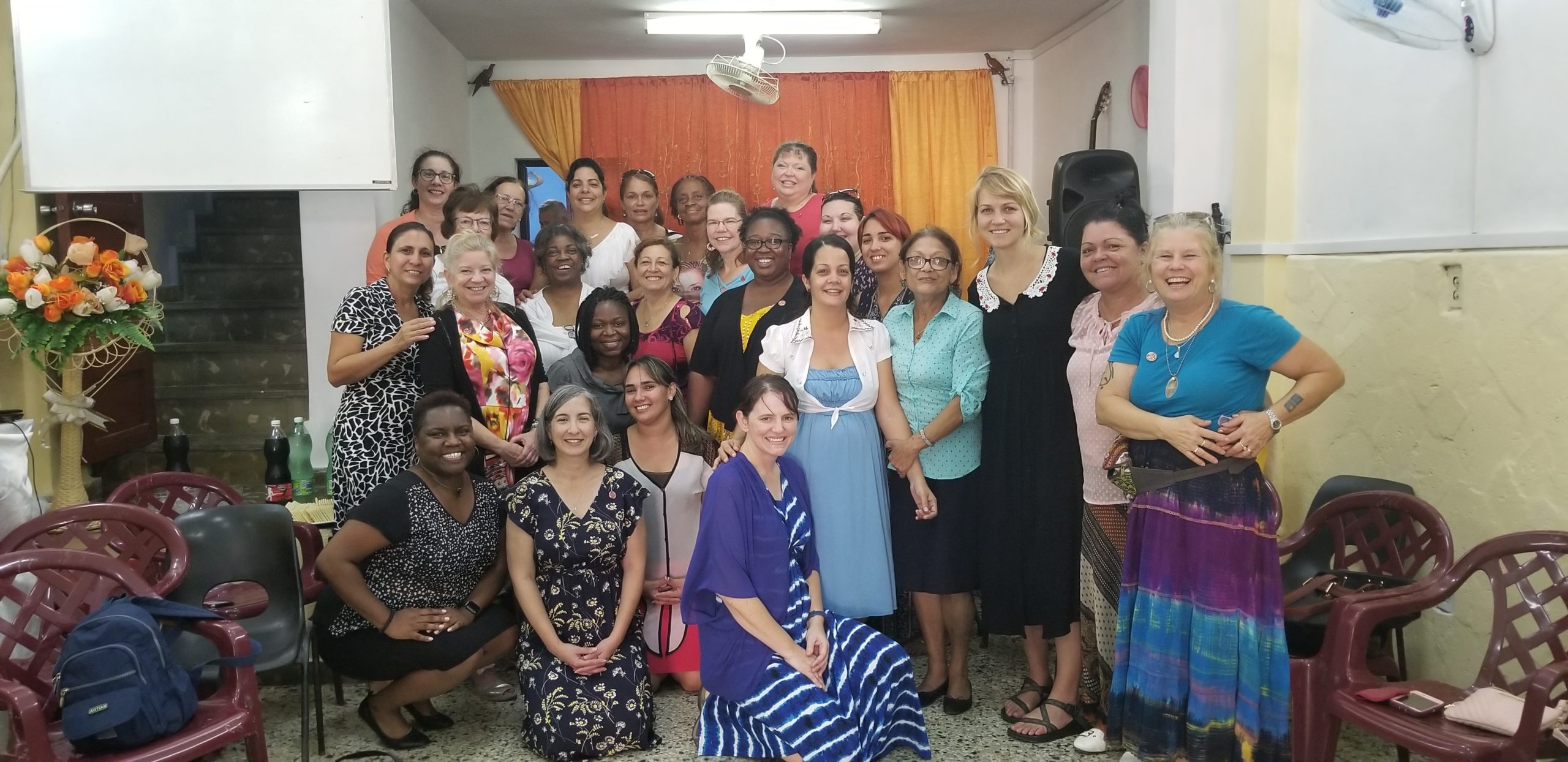 Cuba: On March 9, 2018, Reverends John C. Dorhauer and Teresa “Terri” Hord Owens, General Ministers and Presidents of the United Church of Christ in the U.S. and the Christian Church (Disciples of Christ) in the U.S. and Canada, respectively, accompanied other heads of communion in the U.S. by signing a letter addressed to the U.S. Congress regarding the reestablishment of the U.S. Embassy in Cuba and to continue strengthening relations between both countries. The heads of communion expressed their great concern about recent U.S. decisions regarding our Embassy in Havana, the suspension of visas and the State Department travel advisory. As a consequence of mysterious and unexplained health issues reported by some U.S. personnel serving at the U.S. Embassy in Cuba, the U.S. Department of State ordered the departure of all nonessential U.S. diplomats from the embassy in Havana, Cuba. This has resulted in a suspension of virtually all consular services at the embassy. Cuban citizens wanting to visit family in the United States for emergencies, connect with church partners or to attend faith-based meetings or assemblies are unable to do so. As a matter of fact, the suspension of visa processing within Cuba requires any Cuban citizen wishing to apply for a visa to do so at a U.S. Embassy outside of Cuba. The increasing costs and complications of the application process—which requires rescheduling interviews, obtaining visas for third countries, international travel, and paying to stay there for at least two weeks—have caused much anguish among our Cuban partners on the island and their families abroad. That decision has affected new economic possibilities in Cuba, where Cubans have opened privately owned bed-and-breakfasts and restaurants, as well as other small businesses. With the downturn in U.S. travel, these private businesses have suffered a severe loss of customers and of income. Many of them have been forced to close. The leaders urged the U.S. Congress to press the administration for the re-staffing of the embassy in Havana, the reinstitution of consular services at the embassy, and the removal of the travel advisory for U.S. citizens to travel to the island.
Cuba: On March 9, 2018, Reverends John C. Dorhauer and Teresa “Terri” Hord Owens, General Ministers and Presidents of the United Church of Christ in the U.S. and the Christian Church (Disciples of Christ) in the U.S. and Canada, respectively, accompanied other heads of communion in the U.S. by signing a letter addressed to the U.S. Congress regarding the reestablishment of the U.S. Embassy in Cuba and to continue strengthening relations between both countries. The heads of communion expressed their great concern about recent U.S. decisions regarding our Embassy in Havana, the suspension of visas and the State Department travel advisory. As a consequence of mysterious and unexplained health issues reported by some U.S. personnel serving at the U.S. Embassy in Cuba, the U.S. Department of State ordered the departure of all nonessential U.S. diplomats from the embassy in Havana, Cuba. This has resulted in a suspension of virtually all consular services at the embassy. Cuban citizens wanting to visit family in the United States for emergencies, connect with church partners or to attend faith-based meetings or assemblies are unable to do so. As a matter of fact, the suspension of visa processing within Cuba requires any Cuban citizen wishing to apply for a visa to do so at a U.S. Embassy outside of Cuba. The increasing costs and complications of the application process—which requires rescheduling interviews, obtaining visas for third countries, international travel, and paying to stay there for at least two weeks—have caused much anguish among our Cuban partners on the island and their families abroad. That decision has affected new economic possibilities in Cuba, where Cubans have opened privately owned bed-and-breakfasts and restaurants, as well as other small businesses. With the downturn in U.S. travel, these private businesses have suffered a severe loss of customers and of income. Many of them have been forced to close. The leaders urged the U.S. Congress to press the administration for the re-staffing of the embassy in Havana, the reinstitution of consular services at the embassy, and the removal of the travel advisory for U.S. citizens to travel to the island.
The Caribbean Initiative (CI): During this past year and a half, Global Ministries has been engaged in the promotion and execution of the Caribbean Initiative (CI). Through the initiative, we invited the whole church to witness together with the Caribbean region through education, advocacy, and support of our partner churches and organizations in Cuba, Haiti, the Dominican Republic, Jamaica, Puerto Rico, Venezuela, and Colombia. Church leaders, congregations, regions and conferences experienced the incredible gifts and the strong testimonios (testimonies) from our partners as they receive and share the Good News of Jesus Christ. A variety of resources have been shared including Bible studies, music, liturgical materials, unique giving opportunities, People-to-People Pilgrimages, videos, children’s resources, and more. In addition, discussions related to the universal challenges contained in this initiative, like the quest for peace and sustainable development in the face of climate change has been addressed through the materials and the pilgrimages across the Caribbean.
More than 30 different written, audio, video materials and recorded webinars were published on our website and are still there for future reference, study and use. That includes Bibles studies, background documents for witness and advocacy, thematic presentations by partners, liturgical materials for special occasions and worship. You can access the materials through our website. One of the most important materials worked in the initiative has to do with the children. By inviting the children to “Embrace the Fruits of the Spirit,” the initiative developed a Vacation Bible School curriculum designed to help children discover the fruits of the spirit and how to apply them in their daily lives while exploring the Caribbean.
To grasp the experience of the Caribbean Initiative, it has been crucial to fully recognize the inspiring work of our partners in the region. One of the examples we can quote regarding the witness of a partner is through the challenges of the ongoing peace process in Colombia. Through meeting our partners, leaders from our churches have reflected upon the contrasts between what they read in the news and the testimonies from the people who put their own commitment and bodies for the cause of peace and justice. The same can be reported from the church delegations that traveled to countries like the Dominican Republic and Cuba, to make themselves present in the lives of the brothers and sisters with whom we collaborate in a spirit of international solidarity. However, a most profound journey that we can describe from the experiences of those pilgrimages during this past year is that one of inner transformation to embrace mission from a different perspective.
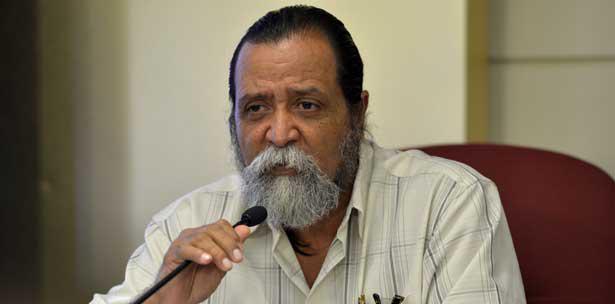 Another way in which the Caribbean Initiative connected people in mission was through giving opportunities. By this key element in mission, churches, conferences and congregations connected with our partners in the Caribbean. Partners like House of Hope in Haiti and Amaneser 2025 in Puerto Rico could develop their ministries regarding the defense of children’s human rights and solar powered communities, respectively, thanks to donations from DOC and UCC congregations. Leaders from the Evangelical Dominican Church and JUSTAPAZ in Colombia could participate in mission-in-residence experiences in the U.S., sharing their experiences with local congregations and networks.
Another way in which the Caribbean Initiative connected people in mission was through giving opportunities. By this key element in mission, churches, conferences and congregations connected with our partners in the Caribbean. Partners like House of Hope in Haiti and Amaneser 2025 in Puerto Rico could develop their ministries regarding the defense of children’s human rights and solar powered communities, respectively, thanks to donations from DOC and UCC congregations. Leaders from the Evangelical Dominican Church and JUSTAPAZ in Colombia could participate in mission-in-residence experiences in the U.S., sharing their experiences with local congregations and networks.
In thinking about the meaning of the Initiative, the Area Executive reflected: “We have shared some “testimonios” of the work of the Caribbean Initiative through this period. As we return to the place where it all began, it is my invitation to you to continue Embracing the Spirit. When we embrace peace, when we embrace justice, when we embrace hope, we do what our partners in the Caribbean have been doing throughout the history of all of their ministries: putting their own bodies, their own circumstances and realities into their commitment for the Gospel and the sharing of the Good News. How can we put our own bodies at stake, if we are about to talk about commitment, ministry, mission, the sake of justice, peace, hope and the fullness of life? May this initiative, as the ones that came before this one, The Congo and the Middle East Initiative and the upcoming Southeast Asia Initiative, continue inviting the church to get deep into our own devotion. As to feel empowered by the Holy Spirit of God, wherever and whenever it may blow, guiding us to His/Her will, which is that all human life and nature have life and that it may be abundantly.”
Conclusion:
I want to end this brief report with the words shared by one of the leaders of the Pentecostal Union of Venezuela (UEPV). Bishop Eseario Sosa-Rodriguez composed a song called “With Faith and Living Hope” (“Fe y Esperanza Viva”). Some of the verses of this song read as follows:
Nos vamos a organizar, (We will organize ourselves)
con fuerza y sabiduría (with strength and wisdom)
y seguiremos cantando (and we will go on singing)
y luchando por la vida (and fighting for the wholeness of life)
The challenge ahead in Latin America and the Caribbean is about how to best accompany our Partners in order to allow them to affirm their own deep expression of a spirituality, based on their particular national ecclesial expressions. How we can embrace with them the connection to the processes of affirmation of human rights, social justice, and spirituality of solidarity? As we sing and share reflections, as we walk alongside them, let’s engage into this exciting experience of finding the challenging balance between devotion and awareness, between sanctity and social action, between praising God and loving the neighbor.

